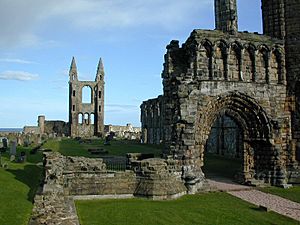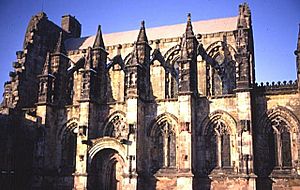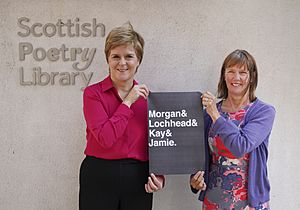Makar facts for kids

A makar is a Scottish word for a poet or a bard. It often means a poet who worked for a king or queen.
Since the 1800s, "The Makars" usually refers to famous Scottish poets from the 1400s and 1500s. These include Robert Henryson, William Dunbar, and Gavin Douglas. They wrote many different kinds of poems in a language called Middle Scots. This was during a time of great change in arts and learning, known as the Northern Renaissance.
Some people called these poets "Scots Chaucerians" because they were influenced by the English poet Geoffrey Chaucer. However, the Makars also used older Scottish writing styles. Later, poets like Allan Ramsay and Robert Fergusson from the 1700s are also called makars.
Since 2002, the word "makar" has been used again for poets who are paid by the public. This started in Edinburgh and spread to other cities like Glasgow and Dundee. In 2004, the Makar or National Poet for Scotland was created by the Scottish Parliament.
Contents
What Does "Makar" Mean?
The word "makar" comes from the Middle Scots language. It means "maker." It's like the Ancient Greek word for poet, which also meant "maker."
Usually, "makar" is used for poets who write in the Scots language. But it doesn't have to be only for Scottish writers. For example, William Dunbar called English poets like Chaucer and Lydgate "makaris."
The Makars in History
The Makars of the 1400s and early 1500s used new ways of writing poetry. They were inspired by poets like Dante and Petrarch in Europe. Their poems were different from earlier Scottish writers who wrote long stories in simple rhyming lines.
However, the Makars still used older Scottish styles. They often included strong alliteration (repeating sounds) and fast storytelling in their poems.

The first important Makar was probably King James I (1394–1437). He likely wrote a famous poem called the Kingis Quair. Other Makars included Richard Holland, Blind Hary, and Walter Kennedy. Many of their works are still around today. This shows that Scotland had a very active poetry scene back then.
Robert Henryson, one of the most famous Makars, might not have been a court poet. But he lived in Dunfermline, where the royal family often stayed.
A golden age for poetry was during the time of King James IV (1488–1513). This period is linked to William Dunbar. A major achievement was Gavin Douglas's Eneados (1513). This was the first full translation of a famous ancient Roman poem into any English-like language. Douglas was also one of the first writers to clearly call his language "Scottis."
During this time, poets used very rich and decorative language, called "aureation." Dunbar's poem Lament for the Makaris (around 1505) lists many poets. Some of them are only known because he mentioned them. This shows how widespread the poetry tradition was.
The Makars valued skill in writing combined with natural speech. They also liked poems that were short and quick. For example, Dunbar praised another poet, Merseir, for writing about love "So short, so quick, of sentence high."
Later Makars, like David Lyndsay, were still greatly influenced by the earlier poets. This influence continued with the Castalian Band at the Scottish court of King James VI. This group included poets like Alexander Montgomerie and the king himself.
King James VI even wrote a book called Reulis and Cautelis (1584). It tried to set rules for Scottish poetry and highlight what made it special. When James VI moved his court to London in 1603, many people think it marked the end of this unique Scottish poetry tradition.
While Chaucer influenced Scottish writers, the Makars also built on older Scottish traditions. They were also inspired by French courtly literature.
Today, the term "makar" can also describe poets from the 1700s Scottish revival. These include Allan Ramsay and Robert Fergusson. More recently, poets like Robert Garioch and Norman MacCaig are also seen as carrying on the Makars' traditions.
Modern Uses of "Makar"
The Scots Makar: Scotland's National Poet
In 2004, the Scottish Parliament created a national poet position called The Scots Makar. The first person to hold this honor was Edwin Morgan. He was Scotland's first official national poet.
After him, Liz Lochhead became the Makar in 2011. Jackie Kay was chosen in 2016. Some people thought the title should just be "National Poet for Scotland." This was because "makar" might be hard for people outside Scotland to understand. But Jackie Kay argued to keep the name "Makar," and it is still used. In August 2021, Kathleen Jamie became the fourth Scots Makar.
City Makars
In 2002, the city of Edinburgh created its own Makar position, called the Edinburgh Makar. Each poet holds the role for three years. The first Edinburgh Makars were Stewart Conn, Valerie Gillies, and Ron Butlin. Other recent Edinburgh Makars include Alan Spence and Christine De Luca. The current Edinburgh Makar (as of 2021) is Hannah Lavery.
Other Scottish cities have also created Makar posts. These include Glasgow (Liz Lochhead), Stirling (Magi Gibson), Aberdeen (Sheena Blackhall), and Dundee (W.N. Herbert).
Other Uses of the Word "Makar"
- The American poet John Berryman used the word "makar" in some of his poems.
- "Makar" is also a character in the video game The Legend of Zelda: The Wind Waker.
- Makar is the name of an indie rock band formed in 2002.
- The Edinburgh Makars is an amateur drama group. It was started in 1932 by the Scottish actress Christine Orr.
See also
 | Percy Lavon Julian |
 | Katherine Johnson |
 | George Washington Carver |
 | Annie Easley |


